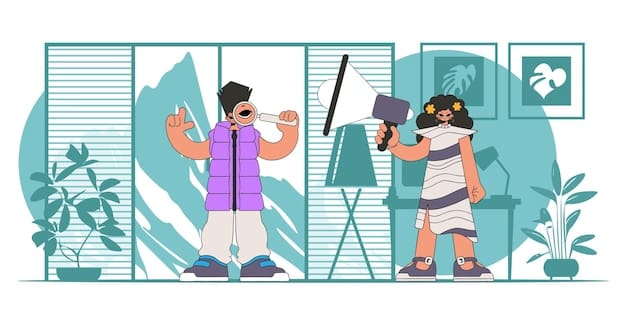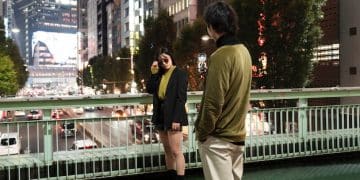Dorama Remakes in 2025: Are They Worth Your Time?

Dorama remakes in 2025 present a mixed bag, with potential for fresh interpretations of beloved stories but also the risk of failing to capture the original’s charm, making it essential to weigh the pros and cons before diving in.
Are dorama remakes in 2025 worth watching? This question is increasingly relevant as the global popularity of doramas continues to surge, leading to a wave of remakes hoping to capture the magic of the originals while appealing to new audiences.
The Allure of Dorama Remakes: A Double-Edged Sword
Dorama remakes have become a significant part of the entertainment landscape, but they come with both exciting possibilities and potential pitfalls. Understanding what makes these remakes appealing and what challenges they face is crucial for assessing their worth in 2025.
The allure of a remake often lies in its promise of a fresh perspective on a beloved story. It’s a chance to modernize narratives, introduce new elements, and cater to contemporary audiences who might not have engaged with the original. However, this also means navigating a minefield of expectations, as fans are often deeply attached to the original characters, plotlines, and overall feel of the dorama.

The Drawbacks of Remaking a Classic
One of the biggest challenges for dorama remakes is maintaining the integrity of the original story while still offering something new. Too much deviation, and the remake risks alienating loyal fans; too little, and it might be seen as a redundant copy. This delicate balance requires a nuanced understanding of the source material and a clear vision for how to adapt it for a new era.
- Nostalgia vs. Innovation: Striking the right balance between honoring the original and bringing something new to the table.
- Casting Choices: Finding actors who can capture the essence of the original characters while bringing their own unique interpretations.
- Cultural Sensitivity: Adapting the story for different cultural contexts, especially when dealing with sensitive or complex themes.
- Modernization Pitfalls: Avoiding the temptation to over-modernize the story to the point where it loses its original charm.
Ultimately, the worth of a dorama remake depends on its ability to strike this balance, offering a novel viewing experience that still resonates with the core themes and emotions of the original. Whether it’s a success or a failure often hinges on careful planning, creative execution, and a deep respect for the source material.
Nostalgia vs. Modernization: Walking the Tightrope
One of the trickiest balancing acts for dorama remakes is figuring out how much to tinker with the original story. Do they keep it true to the source material, or do they give it a modern spin? This decision can make or break a remake’s success.
On one hand, sticking closely to the original caters to the nostalgia of long-time fans. They want to see their favorite characters and storylines brought to life with the same charm and emotional depth. On the other hand, modernizing a dorama can attract new viewers who might not connect with older themes or production styles.
Potential Pitfalls of Modernization
Modernization can lead to problems if not handled carefully. For example, changing the setting, updating the characters’ professions, or altering the plot to fit current trends can strip away what made the original dorama special. It’s essential to recognize which elements are core to the story’s heart and which can be adapted without losing its essence.

- Character Updates: Modernizing character traits and backstories to resonate with contemporary audiences, but avoiding stereotypes.
- Technology Integration: Incorporating modern technology (smartphones, social media) without it feeling forced or out of place.
- Plot Twists: Adding new plot twists to keep the story fresh, but ensuring they align with the original’s thematic integrity.
Ultimately, the best approach depends on the specific dorama and its fanbase. Some stories lend themselves well to modernization, while others are better left untouched. The key is to approach the remake with a clear understanding of its target audience and a thoughtful plan for how to balance nostalgia with innovation.
Casting Choices: Can New Actors Fill Big Shoes?
Casting is a critical element that can significantly impact the success of a dorama remake. Finding actors who can convincingly portray beloved characters while bringing their own unique talents to the roles is a daunting task.
The audience often has strong attachments to the original cast, and any new actors are immediately compared to their predecessors. This scrutiny places immense pressure on the new cast members, who must not only capture the essence of the characters but also avoid mere imitation. The ideal casting choice can breathe new life into the characters, while a misstep can lead to fan disappointment.
The Importance of Chemistry and Charisma
Beyond physical resemblance, the actors must possess the charisma and chemistry required to make the characters believable and engaging. This is especially important for romantic storylines, where the connection between the lead actors can determine the success of the entire series. The ability of the actors to connect with each other and convey genuine emotions will ultimately shape the audience’s experience of the remake.
- Physical Resemblance: How closely the new actors resemble the original cast members.
- Acting Ability: The new cast’s acting skills in capturing the nuances, emotional depth, and mannerisms of the characters they are portraying.
- Audience Reception: Initial audience reactions to the casting choices.
Ultimately, the worth of a remake may hinge on its ability to find the right actors who are not only talented but also capable of winning over the hearts of both new and long-time dorama fans.
Directorial Vision: Reinterpreting the Story for a New Era
The director’s vision is instrumental in shaping how a dorama remake is received. A skilled director can retain the heart of the original while injecting fresh perspectives and innovative techniques to appeal to modern audiences.
A director’s role involves much more than just replicating the original scenes. It requires a comprehensive understanding of the source material, coupled with the creativity to adapt the story for a contemporary audience. This includes reimagining the visual style, pacing, and emotional tone of the dorama to resonate with today’s viewers.
The Director’s Creative License
The director has the creative license to reframe narratives, enhance character developments, and introduce visual elements that add depth to the storytelling. However, wielding this creative power comes with responsibility. The director must balance the need to innovate with the obligation to respect the existing lore and fan expectations.
- Visual Style and Pacing: Ways the director updates the visual elements of the show, such as camera angles, set designs, and editing techniques, to enhance engagement while keeping the essence of the story.
- Character Depth: Approaches the director uses to provide a deeper insight into the characters, making them more relatable or complex for modern audiences.
- Balancing Innovation and Originality: Methods the director applies to blend new ideas with the established framework to maintain the appeal of the remake.
Ultimately, the director’s vision can significantly influence whether a dorama remake becomes a celebrated adaptation or a disappointing replica. The director’s ability to understand the original’s appeal, adapt it thoughtfully, and present it in an engaging manner can determine the remake’s overall success.
Global Sensibilities: Adapting Cultural Nuances for International Audiences
As doramas continue to gain global popularity, the issue of cultural adaptation becomes crucial for remakes. Original doramas often contain cultural nuances and references that might not be immediately understood or appreciated by international audiences.
Successful dorama remakes must carefully navigate these cultural differences to ensure that the story remains accessible and relatable to a global audience. This adaptation can involve subtle tweaks to the dialogue, setting, or character interactions to make the narrative flow smoothly across cultural boundaries.
The Challenges of Cultural Translation
However, the process of cultural translation is not without its challenges. It’s essential to avoid oversimplifying or erasing the original cultural context to the point where the story becomes generic or loses its authenticity. The goal is to strike a balance between making the dorama accessible and preserving the cultural essence that makes it unique.
- Avoiding Stereotypes: Addressing cultural depictions with sensitivity and accuracy to prevent misrepresentations in remakes.
- Preserving Original Themes: Maintaining the core themes of the dorama to ensure the emotional depth and cultural meaning are preserved.
- Global Appeal vs. Authenticity: Understanding how to balance worldwide relatability with respect to the cultural originality of the series.
Ultimately, the worth of a dorama remake can depend on its ability to successfully bridge cultural gaps. A remake that thoughtfully adapts cultural nuances while retaining the heart of the story is more likely to resonate with a broad audience and achieve global success.
Future Trends: What to Expect from Dorama Remakes in 2025
Looking ahead to 2025, several trends are expected to shape the landscape of dorama remakes. Advancements in technology, changing audience preferences, and increasing globalization will all play a role in the evolution of these adaptations.
One likely trend is the incorporation of more interactive elements into dorama remakes. This could include allowing viewers to influence the storyline through online polls or providing immersive experiences through virtual reality. These interactive components seek to enhance viewer engagement and create more personalized viewing experiences.
Technological Innovations and Audience Demands
Another trend is the use of advanced visual effects and production techniques to enhance the quality and appeal of dorama remakes. High-definition cinematography, CGI, and state-of-the-art sound design are becoming more commonplace, reflecting a growing demand for visually stunning and immersive storytelling.
- Interactive Storytelling: Incorporating interactive elements in remakes via polls to allow viewers to influence storylines.
- Global Appeal: Creating adaptations that resonate with diverse cultures by employing inclusive themes.
- Technological Enhancements: Utilizing advanced visual effects and state-of-the-art sound design, fulfilling audience wishes for higher production quality.
Ultimately, the worth of dorama remakes will depend on their ability to adapt to these evolving trends. Those that embrace technological innovations, cater to diverse global audiences, and prioritize high-quality storytelling will likely emerge as the most successful and impactful in 2025 and beyond.
| Key Aspect | Brief Description |
|---|---|
| 🤔 Balancing Nostalgia | Remakes must honor the original while adding contemporary elements. |
| 🎭 Casting Choices | Actors must capture characters’ essence yet bring fresh interpretations. |
| 🎬 Director’s Vision | Directors must reinvent narratives while respecting original themes. |
| 🌎 Global Sensibilities | Cultural adaptations must ease comprehension for global audiences. |
Frequently Asked Questions
A successful dorama remake balances nostalgia with innovative elements, ensuring it stays true to the original story while appealing to new audiences with fresh interpretations and modern production values.
Casting is crucial because actors must capture the essence of the original characters while bringing their own unique talent. Good casting decisions often determine how well the remake connects with viewers.
Directors face the challenge of reinterpreting the dorama for a modern context without losing its original charm. This requires a deep understanding of both the old and new viewer expectations.
Cultural adaptation is necessary to make the dorama accessible and relatable to a global audience. It ensures the story resonates with viewers from different cultural backgrounds without losing its originality.
Future trends include interactive storytelling, broader global inclusivity, and more advanced technological enhancements. These changes should cater to evolving viewer demands for immersive, high-quality entertainment options.
Conclusion
In conclusion, whether dorama remakes in 2025 are worth watching depends on a combination of factors, including how well they balance nostalgia with innovation, the strength of the casting choices, the vision of the director, and the sensitivity toward cultural adaptations. Ultimately, those remakes that successfully navigate these challenges are more likely to offer a compelling and worthwhile viewing experience.






